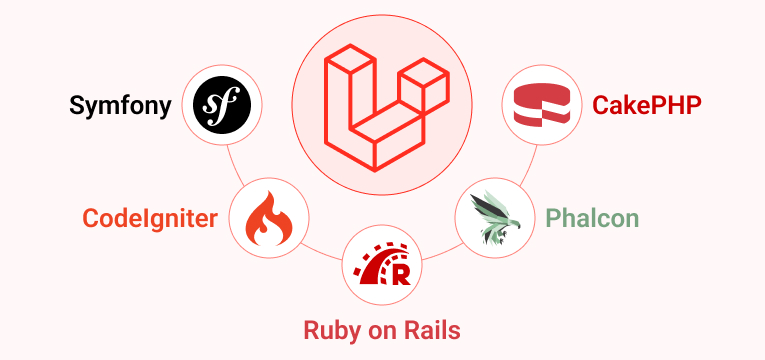Table of Content
Top 5 Laravel Alternatives
Laravel is developed by Taylor Otwell and is a framework used for effective web development. It was developed using the PHP programming language.
Laravel offers a powerful application programming interface (API) for the back end of web apps. Laravel Sanctum makes it easy to implement secure authentication for APIs and web applications.
However, there are other excellent choices other than Laravel as well. So, let’s check out some excellent Laravel alternatives before you hire Laravel developers India for your web development project. This post provides you with a thorough understanding of the available web development framework choices and their benefits over Laravel. For that, let’s first discuss the advantages and disadvantages of Laravel.
1. Top 5 Laravel Alternative
1.1 Symfony

One of the earliest PHP frameworks, Symfony was released in 2005 and consists of a collection of PHP components that are reused to build complex websites.
Its goal is the same as that of the Spring Framework for Java; namely, the construction of dependable enterprise-level software. With Symfony, programmers have complete freedom to alter any and all aspects of the project’s setup.

Symfony framework is also very popular in GitHub with 28.5k stars and 9.1k forks.
1.1.1 Pros and Cons of Symfony
Pros of Symfony
- The Symfony community is one of the largest available since so many developers use it.
- Symfony is used by popular systems including Drupal, Magento, and eZ Publish.
- Symfony continues to evolve to meet the changing demands of web developers.
- The code quality is top-notch.
Cons of Symfony
- Long time and patience are needed for development and rollout.
- Due to its reliance on external technologies, it may cause some programs to take longer to load due to a deficiency of origin elements.
- Testing takes extra time because of the requirement to rewrite code for different purposes.
- Symfony is a PHP framework that might be more challenging to master at first.
1.1.2 Why Choose Symfony Over Laravel?
Symfony’s design is solid, so it can handle a bigger initial investment of time and money and still do an effective implementation that can grow. In addition to this, several well-known companies rely on this PHP framework.
Furthermore, Symfony is the most popular option since it facilitates the development of sophisticated web applications.
Further Reading on: Symfony vs Laravel – Which PHP Framework to Choose?
1.2 CodeIgniter

CodeIgniter framework, is an open-source, rapid-development web framework that relies heavily on the model-view-controller (MVC) development approach and is used to create interactive websites.
It allows projects to be deployed more quickly than if code had to be written from the start. A large number of libraries are available, along with a user-friendly interface and a well-thought-out layout.

Apart from this, CodeIgniter also has a huge community on StackOverflow where developers’ can ask a question and experts can provide suitable solutions.
1.2.1 Pros and Cons of CodeIgniter
Pros of CodeIgniter
- Very small footprint
- Simple configuration settings
- Presents a Modern Separation Concept
- Allows for caching of both web pages and databases
- Includes a number of Safety Measures by Design
- Simple to alter and add to
Cons of CodeIgniter
- Lacks a focus on making code easily maintainable
- Library resources are insufficient
1.2.2 Why Choose CodeIgniter over Laravel?
CodeIgniter is simpler to use for the majority of developers. Laravel’s convenience is matched only by its adherence to a small set of standards and guidelines. CodeIgniter also offers improved error handling and more leeway in terms of customization. Overall, in comparison of Laravel and CodeIgniter, CodeIgniter might be the simpler choice for most web programmers.
1.3 CakePHP

CakePHP is one of the most popular Laravel alternatives since it offers many of the same capabilities and can speed up the pace of development.
It’s a large, feature-rich, free, and open-source web development framework for PHP that uses the HMVC architecture. Numerous Rails components are adapted here, such as the Convention over Configuration paradigm, in-built validation, app scaffolding, etc.

CakePHP has 8.6k stars and 3.5k forks on GitHub which makes it one of the most popular web development frameworks.
1.3.1 Pros and Cons of CakePHP
Pros of CakePHP
- The CakePHP framework simplifies the process of authenticating users.
- This framework is easy to learn. It’s a huge help in cutting down on the complexity of making web applications.
- It’s very useful for sophisticated apps and websites. CakePHP has a Model-View-Controller architecture.
- The framework allows for automated placement and configuration of the website.
- CakePHP’s extensive library of prebuilt themes is a major plus. Accelerating the creation of web applications is a direct outcome.
- The structure can be easily managed. It’s easy enough for non-programmers to use.
- CakePHP has convenient features for doing local tests. This simplifies development and reduces time spent on testing.
Cons of CakePHP
- CakePHP is unique among frameworks in that it necessitates modifying existing default routes before generating URLs.
- When contrasting Cake PHP with other Laravel alternatives, Way routing stands up as a shortcoming.
- The documentation for CakePHP is not very comprehensive.
- Users had trouble making the transition from CakePHP 2 to 3. Several speed optimization upgrades that might otherwise work with older versions of PHP are not supported.
1.3.2 Why Choose CakePHP over Laravel?
CakePHP is less complicated to work with than Laravel. CakePHP’s stated goal is to streamline the processes of developing, deploying, and maintaining Web Apps. The clean MVC layout makes it easy to pick up and use.
1.4 Phalcon

Phalcon is an efficient PHP framework that uses the MVC design pattern. It has been freely available to the public since its first 2012 release. C and Zephir are the main programming languages used here.
One further thing that makes Phalcon stand out is that it was the first framework to use object-relational mapping (ORM) written in C. Zephir, a high-level programming language, which makes Phalcon incredibly adaptable. However, Phalcon also makes it possible to create PHP apps without learning C.
1.4.1 Pros and Cons of Phalcon
Pros of Phalcon
- All software parts are isolated using Dependencies Injection.
- Simultaneous use of two or more languages.
- Code encryption and password hashing add an extra layer of safety.
- Control application-level CSS and JavaScript libraries.
- Use Flash Messages to alert the user in real-time.
Cons of Phalcon
- Inadequate marketing has resulted in a programming community that is mostly unaware of Phalcon’s existence.
- There is no compiled add-on.
- Setup is difficult and complex.
- Doesn’t use public servers.
- Due to the small community, you will not be able to find the solutions to your problems or queries.
1.4.2 Why Choose Phalcon over Laravel?
Due to its C-based framework extension, Phalcon is among the most efficient and rapid PHP frameworks available. However, Laravel is a slower framework since it relies heavily on PHP and Symfony. The performance and speed of Phalcon are superior to those of Laravel Alternatives.
1.5 Ruby on Rails

In the same way that Laravel has a model-view-controller design, Ruby on Rails is a full-stack web development framework because it runs on a web server.
Ruby on Rails has expanded greatly since its inception and now offers predefined frameworks for websites, online services, and databases. It uses web technologies such as HTML, JavaScript, and CSS for the UI and JSON for data transport, and it runs on most services that accept CGI.

Learning curve of ROR is difficult but developers’ can seek help from a huge community of ROR experts on StackOverflow.
1.5.1 Pros and Cons of ROR
Pros of ROR
- Time effective
- Numerous resources and libraries are designed to facilitate work
- Large and active population
- Extremely stringent adherence to norms
Cons of ROR
- Lack of adaptability
- Constant progression
- Poor performance
1.5.2 Why Choose ROR over Laravel?
In terms of documentation, guidelines, and libraries, Ruby on Rails is the superior framework for smaller applications. Since it entered the online scene before Laravel, its community is larger and more well-liked among programmers. When compared to other Laravel alternatives, Ruby’s code is much simpler to understand and write.
2. Conclusion
Laravel is currently among the sought-after web frameworks in the industry. Laravel’s use of PHP, a widely used language, makes it more approachable and flexible than competing frameworks. Laravel alternatives exist, but ultimately it is up to the developers and project requirements to decide which one is most suited to their needs.

Hardik Dhanani has a strong technical proficiency and domain expertise which comes by managing multiple development projects of clients from different demographics. Hardik helps clients gain added-advantage over compliance and technological trends. He is one of the core members of the technical analysis team.
Looking for Laravel eCommerce package options? Find out its options here & why Laravel is the best option for building cutting-edge online stores by reading...
 Oct 4, 2023
Oct 4, 2023 



Comments
Leave a message...